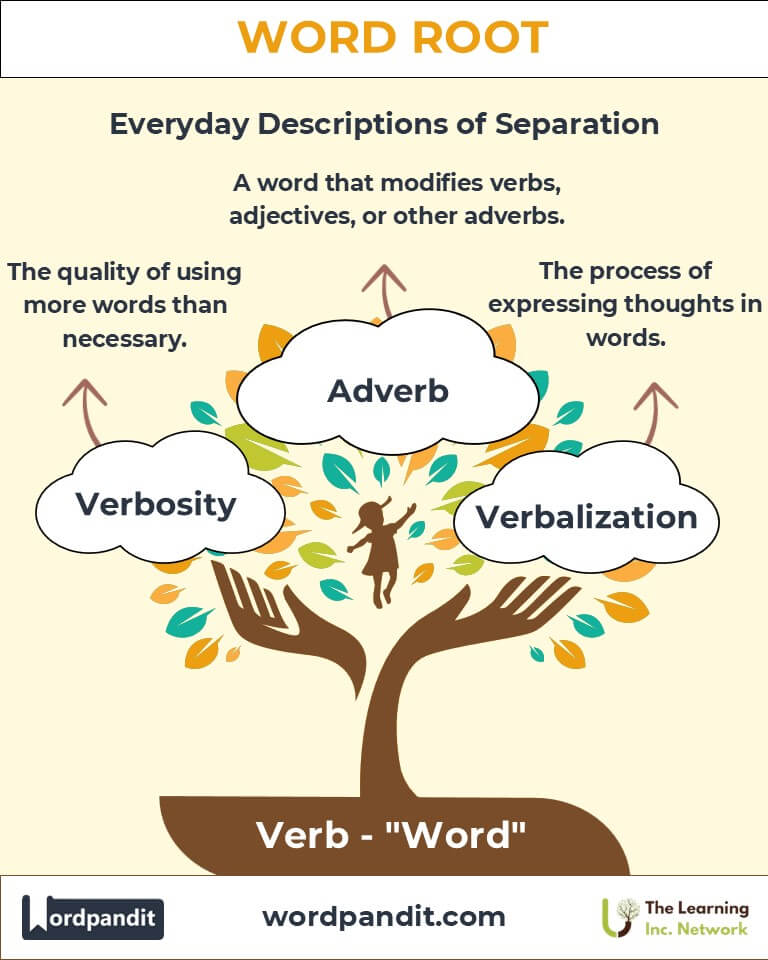Verb: Unlocking the Power of Words and Expression
Byline: Discover the versatility and impact of the root "verb," stemming from the Latin "verbum," meaning "word." Words like "verbal" and "proverb" show how this root has become foundational in communication, literature, and beyond.

Table of Contents
- Introduction: The Essence of "Verb"
- Etymology and Historical Journey
- Mnemonic: Remembering "Verb" Easily
- Common "Verb"-Related Terms
- "Verb" Through Time
- "Verb" in Specialized Fields
- Illustrative Story: "Verb" in Action
- Cultural Significance of "Verb"
- The "Verb" Family Tree
- FAQs About the "Verb" Word Root
- Test Your Knowledge: "Verb" Word Root Quiz
- Conclusion: The Living Legacy of "Verb"
Introduction: The Essence of "Verb"
The root "verb," pronounced (verb), is at the heart of language, symbolizing the power of words to convey thoughts, actions, and ideas. From straightforward communication in everyday speech to the complexities of proverbs and poetry, "verb" plays a pivotal role in how we connect and express ourselves.

Etymology and Historical Journey
The root "verb" originates from the Latin word verbum, meaning "word." Ancient Roman grammarians emphasized the importance of the verb as the cornerstone of sentence structure, describing actions or states of being. Over time, this root has influenced countless languages, embedding itself into terms that explore verbal expression and communication.
Mnemonic: Remembering "Verb" Easily
To remember "verb," picture a glowing book with the word "VERB" lighting up every page. Imagine words coming to life, dancing off the pages to express stories and emotions.
Mnemonic Device: "VERB illuminates words, giving life to language and action."
Common "Verb"-Related Terms
- Verbal (VER-buhl): Related to words or spoken communication.
Example: "Her verbal skills impressed everyone during the debate." - Proverb (PRO-vurb): A short saying expressing a general truth or wisdom.
Example: "The proverb ‘Actions speak louder than words’ is universally recognized." - Verbiage (VER-bee-ij): Excessive use of words.
Example: "The contract’s dense verbiage made it hard to understand." - Verbosity (ver-BAH-sit-ee): The quality of using more words than necessary.
Example: "His verbosity often obscured his main point." - Adverb (AD-vurb): A word that modifies verbs, adjectives, or other adverbs.
Example: "In ‘She sang beautifully,’ the adverb ‘beautifully’ modifies ‘sang.’"
"Verb" Through Time
- Latin Roots: The root’s earliest use emphasized verbal communication in education and rhetoric.
- Medieval Era: Proverbs became popular as a means to convey moral lessons succinctly.
- Modern Usage: "Verb" expanded to include terms in linguistics, computer programming, and advertising.
"Verb" in Specialized Fields
- Linguistics:
- Verbalization: The process of expressing thoughts in words.
Example: "Children develop verbalization skills early in life."
- Verbalization: The process of expressing thoughts in words.
- Technology:
- Voice Recognition: Verbal commands are central to AI systems.
Example: "Verbal inputs are analyzed by natural language processors."
- Voice Recognition: Verbal commands are central to AI systems.
- Education:
- Verbal Reasoning: A cognitive skill assessed in standardized tests.
Example: "Verbal reasoning evaluates logic and language understanding."
- Verbal Reasoning: A cognitive skill assessed in standardized tests.
Illustrative Story: "Verb" in Action
Sophia loved collecting proverbs, finding joy in their timeless wisdom. One day, her verbal eloquence was put to the test during a community debate. Quoting a proverb, "A stitch in time saves nine," she effectively argued for early action on environmental conservation. Her thoughtful use of words inspired others, proving the power of the "verb" root in action.
Cultural Significance of "Verb"
The root "verb" has shaped cultures worldwide, from oral traditions rich with proverbs to written texts that form the bedrock of education and law. It reflects humanity's enduring need to share wisdom and ideas through language.

The "Verb" Family Tree
- Verbum (Latin: word):
Examples: Verbose (using too many words), Verbalize (to articulate in words). - Lex (Latin: word, law):
Example: Lexicon (a dictionary or vocabulary). - Log (Greek: word, reason):
Example: Dialogue (a conversation or exchange of ideas).

FAQs About " Verb "
Q: What does the root "verb" mean?
A: The root "verb" originates from the Latin verbum, meaning "word." It forms the basis of terms related to language, communication, and expression, emphasizing the use of words in spoken or written form.
Q: What is the difference between a verb and a proverb?
A: A verb is a grammatical term for a word that conveys action, occurrence, or a state of being (e.g., "run," "is"). A proverb, on the other hand, is a short, commonly used saying that expresses a universal truth or practical advice (e.g., "The early bird catches the worm").
Q: Is "verb" only used in grammar?
A: No, the root "verb" is not limited to grammar. While it is central to linguistic terms like "verb" and "adverb," it also appears in words describing verbal communication (e.g., "verbalize") and dense language (e.g., "verbiage").
Q: What is verbiage, and why is it often criticized?
A: Verbiage refers to the excessive or unnecessary use of words, often making communication unclear or tedious. It is criticized because it can detract from the core message and confuse the audience.
Q: What does "verbal reasoning" mean?
A: Verbal reasoning is a cognitive skill that involves understanding and reasoning using concepts framed in words. It is commonly assessed in aptitude tests to measure logical thinking and comprehension.
Test Your Knowledge: " Verb " Mastery Quiz
1. What does "verb" signify?
2. What is an example of a proverb?
3. Which word describes excessive word use?
4. What does an adverb modify?
5. What is "verbal reasoning"?
Conclusion: The Living Legacy of "Verb"
The root "verb" showcases the profound influence of words in shaping thought, culture, and expression. Whether spoken or written, words connect us, teach us, and empower us to convey ideas. As language evolves, "verb" remains central to its growth, inspiring the timeless art of communication.












